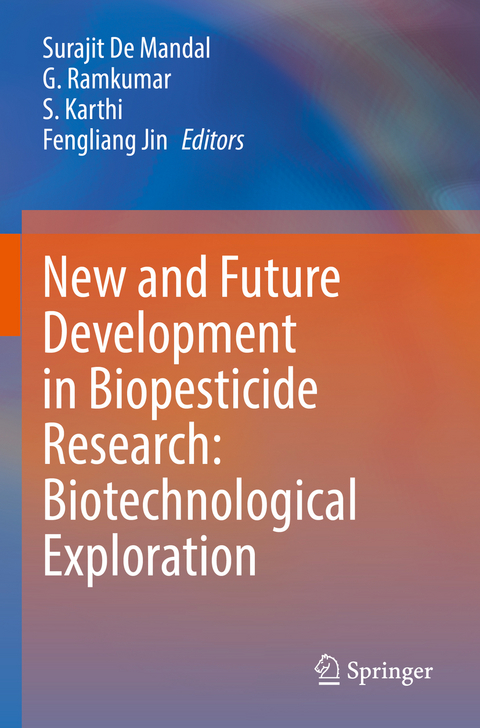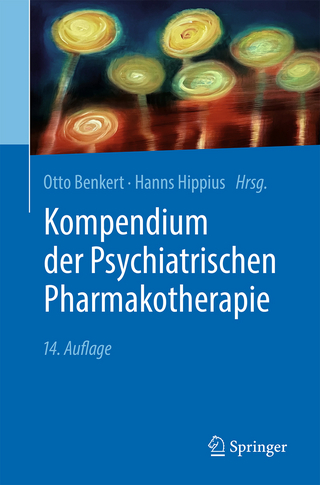
New and Future Development in Biopesticide Research: Biotechnological Exploration
Springer Verlag, Singapore
978-981-16-3991-3 (ISBN)
This informative book is meant for students and researchers in the fields of biotechnology, agriculture and applied microbiology.
Dr. Surajit De Mandal is a postdoctoral fellow at the College of Plant Protection, South China Agricultural University, Guangzhou, P. R. China. He has several years of research experience and published many research articles in international journals. He also acts as an editorial board member/reviewer for various international journals. His field of interest includes microbial diversity and metagenomics, molecular phylogeny, bioinformatics and microbial control of insect pests. He is presently working on microbial community analysis using next-generation sequencing methods.. Dr. Fengliang Jin is a Professor in the Department of Entomology, College of Agriculture, South China Agricultural University, Guangzhou, 510642 P.R.China. His major research interest is on the role of non-coding RNAs in the regulation of insect immune signal transduction, exploring the interaction mechanism of insects to entomopathogens using next generation sequencing and bioinformatic analysis and RNAi-based functional analysis of immune-related genes and their role in the regulation of antimicrobial peptides of insects. Prof. Jin served as a Principal Investigator for several research projects related to the development of Biopesticide from various agencies. He has several patents, scientific articles and presently serving as a reviewer and editor in many international journals. Dr. S. Karthi is currently working as a postdoctoral fellow (UGC-DSKPDF, New Delhi) at the Centre for Environmental Sciences, Sri Paramakalyani Centre for Environmental Sciences, Manonmaniam Sundaranar University, India. He also worked as a Post Doctoral Fellow (DST-SERB, N-PDF) at Manonmaniam Sundaranar University, India, and Assistant Professor in Rangasamy College of Arts and Science, India. He has published several high-quality research articles and served as a reviewer for many journals. Presently he is working on the Natural products for Mosquito and Disease Control. Dr. G. Ramkumar is a Research Associate at the Indian Institute of Horticultural Research, Bangalore, India. He has completed his Ph.D. from Periyar University, India. His main areas of research are Vector Control, Insecticides Resistance monitoring, RNAi, Gene editing etc. He has published many scientific articles and edited several books on entomology. He is the editorial board member/ reviewer of several journals such as International Journal of Mosquito Research, International Journal of Zoology Studies, International Journal of Entomology Research, International Journal of Biology Research, Natural Product Research, International Journal of Pest Management, Environmental Asia, Hazardous Materials, Biocatalysis, and Agricultural Biotechnology, etc. Presently he is actively involved in the research on Insect Molecular Toxicology.
Chapter 1. Biopesticides in sustainable agriculture: current status and future prospects.- Chapter 2. Entomopathogenic Fungi: Current Status and Prospects.- Chapter 3. Utilization of Entomopathogenic Bacteria for modern insect pest management.- Chapter 4. Entomopathogenic Nematodes (EPNs): A Green Strategy for Management of Insect-Pests of Crops.- Chapter 5. Trends in neem (Azadirachta indica)-based botanical pesticides.- Chapter 6. Role of Plant Essential Oils in Pest Management.- Chapter 7. Plant Secondary Metabolites: Emerging Trends in Agricultural Pests Control.- Chapter 8. Transgenic plants and its role in insect control.- Chapter 9. Improving Insect Control Using Genetically Modified Entomopathogens.- Chapter 10. Importance of metabolic enzymes and their role in insecticide resistance.- Chapter 11. Insect microbiota and host immunity: An emerging target for pest control.-Chapter 12. Eco-smart Biorational Approaches in Housefly Musca domestica L. 1758 Management.
| Erscheinungsdatum | 09.05.2023 |
|---|---|
| Zusatzinfo | 1 Illustrations, black and white; VIII, 303 p. 1 illus. |
| Verlagsort | Singapore |
| Sprache | englisch |
| Maße | 155 x 235 mm |
| Themenwelt | Medizin / Pharmazie ► Medizinische Fachgebiete ► Pharmakologie / Pharmakotherapie |
| Naturwissenschaften ► Biologie ► Mikrobiologie / Immunologie | |
| Technik ► Umwelttechnik / Biotechnologie | |
| Schlagworte | biopesticides • Entomopathogen • insecticides resistance • nano-biopesticide • pest control • plant secondary metabolite |
| ISBN-10 | 981-16-3991-4 / 9811639914 |
| ISBN-13 | 978-981-16-3991-3 / 9789811639913 |
| Zustand | Neuware |
| Haben Sie eine Frage zum Produkt? |
aus dem Bereich


